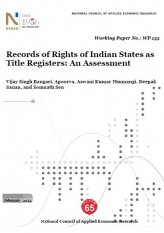Records of Rights of Indian States as Title Registers: An Assessment
Vijay Singh Bangari
Aswani Munnangi
Apoorva
Deepak Sanan
Somnath Sen
February 2022
In the Land Governance space, a meaningful conversation on the issue of ‘How’ and in ‘What’ format should Title Registers (generally called Record of Rights - RoRs, in rural India) be maintained in India, has been missing. Literature is very scanty on a subject that has considerable bearing on the utility of land records as a credible evidence of both title and the ground-level situation. More meaningful and comprehensive records could forestall a lot of litigation and avoiding redundant information could aid in the efficiency of record maintenance. These aspects about the form in which the RoRs are kept have received very little attention and recent discourse has been dominated by ‘Which’ Land Registration System (presumptive or conclusive) should be the goal rather than ‘What’ form will be more effective. This paper tries to bridge the gap in the literature by studying the format/practice of maintaining Land Records both internationally and within India. For this purpose, two distinct samples, i.e., Domestic and International, are laid out/assembled. The Indian sample consists of 28 Indian States/UTs, whereas the international sample has 21 countries. Samples are collected for the respective states and country wise title registers to study their formats and information included within them. The study was conducted based on an a prior understanding that there is merit in title records including 5 1 parameters, i.e., Ownership, Possession, Land Area, Land Use and Encumbrance, plus an Unique Id. Therefore, the record-keeping systems were assessed against this touchstone. ‘Other’ information included within these documents is also considered. The study revealed significant differences in the formats/practices amongst various countries and even amongst the Indian States. This analysis provides suggestions on how the Record of Rights could be improved for better land governance in different Indian States.s aimed at promoting more equitable gender outcomes pertaining to land ownership in India.
States, Sectors, Surveys, and Impact Evaluation







